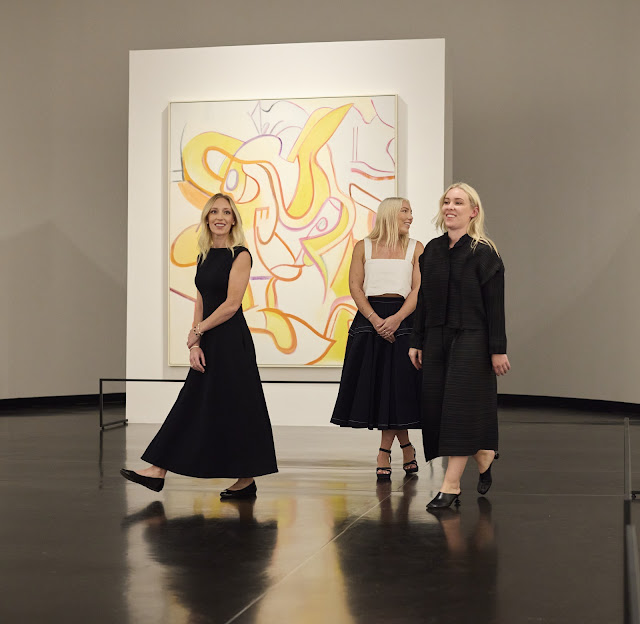" Willem de Kooning - a maverick painter"
Gallerie dell'Accademia
Willem de Kooning and Italy
Willem de Kooning, one of the most revolutionary and influential artists of the 20th century, is
the subject of a major exhibition at the Galleriedell’Accademia - until September 15 - entitled - Willem de Kooning and Italy - curated - by Gary Garrels and Mario Codognato.The exhibition is the first to explore the time de Kooning spent in Italy in 1959 and 1969 and
the profound impact those visits had on his work. It brings together 75 works, making it the
largest presentation of the artist ever organised in Italy. The curators have established the
influence of Italy on de Kooning’s subsequent paintings, drawings and sculpture in America,
which has never before been thoroughly researched. The lasting effect of these two creative
periods are revealed in an outstanding selection of works, ranging from the late 1950s through
to the 1980s.
William de Kooning - The Cat's Meow - 1987
Photo by David Levene - 2024 - Private Collection - copyright 2024 - The Willem de Kooning Foundation SIAE - courtesy - Gallerie dell'Accademia
Isabel, Lucy and Emma de Kooning Villeneuve
in front of
Willem de Kooning - The Cat's Meow - oil on canvas -1987
"Willem de Kooning collected from the
cacophony of visual excitement, light and movement in daily life to create his own lexicon. The
impact of any visual encounter could render or generate an idea for moving into a new drawing
or painting. Observing how his New York and East Hampton environments worked into his
paintings and drawings, the same occurred in Rome – a gestalt of “glimpses”. During these
formative periods of time in Rome, de Kooning synthesised from all around him a new way of
looking and activating his medium, experiencing both classical Italian paintings and sculpture
as well as the work of his new Italian artist friends.”
Gary Garrells - Mario Codognato
curators
For the first time, three of de Kooning’s best-known pastoral landscapes Door to the River, A
Tree in Naples and Villa Borghese are exhibited together. Painted in New York in 1960, the
lingering memory of his trip to Italy is clear. This section of the exhibition also includes large
figurative paintings from the mid-1960s that paved the way for his interest in sculpture.
Seated Woman on a Bench - 1972
A Tree in Naples - 1960 - Door to the River - 1960 - Villa Borghese -1960
Photo by David Levene - 2024 - Private Collection - copyright 2024 - Guggenheim Museum Bilbao -The Willem de Kooning Foundation SIAE - courtesy - Gallerie dell'Accademia
Gary Garrels, Amy Schichtel, Giulio Manieri Elia and Mario Codognato
in front of
Willem de Kooning - Villa Borghese - oil on canvas - 1960
De Kooning a maverick painter, who rejected the accepted stylistic norms by dissolving the relationship between foreground and background and by using paint to create emotive, abstract gestures, de Kooning, with his peers of the late forties and early fifties, was variously labelled as an - Action Painter - Abstract Expressionist - or simply of the - New York School. De Kooning was one of the handful of non-conforming artists responsible for the historic shift of the center of avant-garde art from Paris to New York in the years following World War II.
Installation View - Willem de Kooning and Italy
The exhibition includes a selection of the large and striking - Black and White Rome - drawings
de Kooning made during his first extended visit to Rome in 1959. They are shown with works
from the late 1950s, made in the years leading up to de Kooning’s first visit to Italy.
Untitled - Rome - 1959
A gallery focusing on sculpture showcases thirteen small bronzes that de Kooning made in
Rome. Created after a chance encounter while in Rome with a sculptor friend, these were the
result of the artist’s first experiments with clay, leading him to produce a substantial body of
sculpture back in New York from 1972 to 1974.
Untitled XXI - 1982
The exhibition also places painting and sculpture in dialogue with drawings from the 1960s and
1970s. Highlights include four ink drawings that de Kooning made while in Spoleto in 1969,
presented alongside a complementary selection of intimate, gestural drawings that are
conceptually related to the sculptures. In these drawings de Kooning fragmented the figure,
often leaving empty spaces balanced against his vigorous lines.
Untitled - Charleston Pose - 1969
The Catalogue
Willem de Kooning and Italy
curated by Gary Garrels and Mario Codognato
published by












